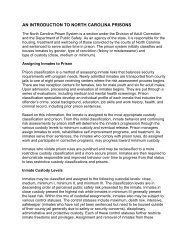August - North Carolina Department of Public Safety
August - North Carolina Department of Public Safety
August - North Carolina Department of Public Safety
- No tags were found...
Create successful ePaper yourself
Turn your PDF publications into a flip-book with our unique Google optimized e-Paper software.
News for and about employees <strong>of</strong> the N.C. <strong>Department</strong> <strong>of</strong> <strong>Public</strong> <strong>Safety</strong>On theA u g u s t 2 0 1 2JusticeReinvestmentPages 4-5Also insideSecretary’s Message 2 Pr<strong>of</strong>ile: Al Ragland 2-3 Tight squeeze 6-7Walk In My Shoes 8-13 ALE awards 14-17 Key legislation 18-19Mystery solved 20 News briefs 21-22 Marking history 23Promotions, retirements & passings 24-25
Time to showhow muchwe careA message fromSecretary Reuben YoungThe 2012 State EmployeesCombined Campaign isquickly approaching, and I encourageeach <strong>of</strong> you to makea contribution that could be felt locally, statewide oreven around the world.A nearly endless list <strong>of</strong> non-pr<strong>of</strong>it agencies improvea community’s well-being, feeding the hungry,helping the elderly, nourishing a child’s development,providing disaster relief, supporting victimrelatedservices, enouraging cultural programs, protectingthe environment or caring for animals. Yourdonation, large or small, to any <strong>of</strong> non-pr<strong>of</strong>it organizations<strong>of</strong>fered in this year’s campaign makes animportant impact on the health <strong>of</strong> our world.Choosing from among the 1,000 local, nationaland worldwide non-pr<strong>of</strong>it organizations may be thehardest part. You may already contribute to individualorganizations independently, but keep in mindthat the SECC is the only workplace giving programauthorized for payroll deduction for state employees.The collective impact <strong>of</strong> those donations does make adifference.The campaign begins Aug. 30 and ends Nov. 10.This year’s Combined Campaign exectives are: TeresaCreech for Administration, Janice King forAdult Correction, Allison Jourdan for CommunityCorrections, Susan Rogers for Correction Enterprises,Barry Bryant and Tricia Hamilton for JuvenileJustice, Lt. Steven Massey and Suzell Crosswhitefor Law Enforcement, and Terry Jones and KarenPardue for Prisons Administration.With your help, we can surpass last year’s combinedtotal from our three former departments, whichwas $468,242. Now is the time to show how muchwe care for these various charities and the good theydo in lifting hearts, souls and minds.The department’s campaign coordinators willbe delivering a donation form, along with the list <strong>of</strong>charitable organizations. I encourage each employeeto open your hearts and give as generously as youcan to the organizations that are most meaningful toyou.Thank you in advance for choosing the State EmployeesCombined Campaign as your way to donateto causes and organizations that make our world abetter place. Your contribution is pro<strong>of</strong> that you careabout your community. Together, we can make a difference.x2 | On the Scene | <strong>August</strong> 2012Pr<strong>of</strong>ile in LeadershipAl Ragland Director, Human ResourcesAs director, Al Ragland leadsthe <strong>Department</strong> <strong>of</strong> <strong>Public</strong><strong>Safety</strong>’s Human Resourcesfunction for more than 25,000employees across the state. Heis responsible for organizationstructure, employee relations,organization developmentand performance,recruiting, classification,compensation, benefits,policies, procedures andculture.Prior to joining <strong>Public</strong><strong>Safety</strong>, Ragland wassenior vice president <strong>of</strong>Headway WorkforceSolutions, City <strong>of</strong>Wilmington chief humanresource <strong>of</strong>ficer/director, Tekelec seniorvice president <strong>of</strong> HumanResources and vicepresident <strong>of</strong> communityand government relations,Sony Ericsson MobileCommunications vice president<strong>of</strong> Human Resources,Ericsson Inc. vice president<strong>of</strong> Human Resources, an independentconsultant and anadjunct lecturer at the <strong>North</strong><strong>Carolina</strong> State UniversitySchool <strong>of</strong> Management.He earned a bachelor <strong>of</strong>science degree in businessmanagement and economicsat Fayetteville State University,and has completed the ExecutiveManagement Institute and the Bank Director’sInstitute at the University <strong>of</strong> <strong>North</strong> <strong>Carolina</strong> atChapel Hill and the Office <strong>of</strong> the Banking Commissioner.Ragland has served in leadership capacitieson several boards, among them Fayetteville StateUniversity’s School <strong>of</strong> Management & Economics,Paragon Commercial Bank, the Society <strong>of</strong> HumanResource Managers, the Food Bank <strong>of</strong> Central/Eastern <strong>North</strong> <strong>Carolina</strong>, the Morrisville Chamber<strong>of</strong> Commerce, Saint Ambrose Episcopal Church,the <strong>Carolina</strong> Ballet, the Wake County Blue RibbonCommittee on The Future Growth <strong>of</strong> Wake CountySee Ragland on page 3
<strong>August</strong> 2012 | On the Scene | 3Raglandfrom page 2and the Wake Education Partnership.Among his appointments are: Chair <strong>of</strong> the State Personnel Commission (by Gov.Bev Perdue); Blue Ribbon Committee on the Future Growth <strong>of</strong> Wake County (by thechair <strong>of</strong> the Wake County Board <strong>of</strong> Commissioners); honorary co-chair for the expansion<strong>of</strong> Wake Med’s Western Wake Hospital; and past president and state director <strong>of</strong>the Raleigh/Wake Chapter <strong>of</strong> the Society <strong>of</strong> Human Resources Managers. Ragland is arecipient <strong>of</strong> the Business Coordinator <strong>of</strong> the Year Award – Inroads, the Saint AmbroseEpiscopal Church Laymen League Man <strong>of</strong> the Year Award, and several managementawards for performance and leadership by Fortune 1,000 companies.Ragland resides in Cary with his wife, Hilda, who is vice president <strong>of</strong> Progress EnergyCorporate <strong>Public</strong> Affairs. Their daughter, Katherine, is a graduate <strong>of</strong> N.C. StateUniversity and a recent graduate student <strong>of</strong> Emory University’s <strong>Public</strong> Health Programin Atlanta, Ga., now working for Thomson Reuters in Richmond, Va.To help us get to know him better, On the Scene asked Ragland:What do you want to be sure employees know about you?“I want employees to know that I am customer-focused, results-oriented and atrusted partner in working with both leaders and employees in our organization to fulfillthe expectations for the citizens in <strong>North</strong> <strong>Carolina</strong>.“The majority <strong>of</strong> my career has been in the business <strong>of</strong> people in both the privateand public sectors. While we may rely on technology and other tools to achieve ourwork, let me tell you, people make it happen day in and day out. Nothing moves withoutpeople, and I rely on talented people to make the difference in what we deliver toour customers. That requires that we clearly understand and buy into constant growthin ourselves to exceed expectations <strong>of</strong> our customers both internal and external.“That mindset was instilled by my parents and has remained with me since I wasa little boy growing up on the farm. Long days, hard work and a sense <strong>of</strong> accomplishmentis what drives me today to do my very best and expect the same from my colleaguesand coworkers. It is important to me that I maintain those values from earlylife and it represents who I am today. This can only be achieved if we believe in thenotion <strong>of</strong> a positive attitude, sense <strong>of</strong> urgency and solution orientation.“The reason we are all here is to ensure what we do will add value to our customerin an efficient and effective manner. We are all measured by what we say we will doand by what we do to create a high level <strong>of</strong> trust from our customers as if DPS wereour business and they would come back again for your service/product that you provide.I think <strong>of</strong> what we do as a business that we want to succeed, and it takes talentedpeople like we have to make that happen, which creates a win-win situation where thestate wins and each employee wins in growing their careers.”What makes you comfortable with your job?“Easy — I like to surround myself with talented people who are highly motivated,with a sense <strong>of</strong> urgency and focused on exceeding the expectations <strong>of</strong> our customers.Sharing my learned experience with my team and colleagues, allows me to learn fromthem, too. I am fortunate to work with a talented leadership team that is resourceful,willing to listen/share with each other thereby allowing each <strong>of</strong> us to draw on thestrengths the team possesses for the enrichment <strong>of</strong> our new department, DPS.”What do you like to do in your free time?“Being a workaholic, my free time is limited, but spending time with my family,volunteering in the community, church and golf when I can work it in, which is only afew times a year.”What did you want to do when you were young?“While I was pretty good at basketball in high school, I still have not gotten thatcall from the NBA. Oh well. So my dream as a young fellow was to be a firefighteror law enforcement <strong>of</strong>ficer. This would allow me the opportunity to work with peoplewho share in the belief <strong>of</strong> “to protect and to serve others.” Today, as the head <strong>of</strong> HRfor DPS, I get to somehow experience it by working closely with an organization thatdoes just that — protect and serve. What more could I ask for!?” x‘I think <strong>of</strong> whatwe do as abusiness that wewant to succeed,and it takestalented peoplelike we haveto make thathappen.’— Al Ragland
4 | On the Scene | <strong>August</strong> 2012Among the 17 statesthat have passedJustice Reinvestmentlegislation,<strong>North</strong> <strong>Carolina</strong> isbeing looked atas a leader.This huge piece<strong>of</strong> legislationaffects not onlycorrections, butmuch <strong>of</strong> ourjudicial family.Justice Reinvestment<strong>Public</strong> <strong>Safety</strong> gets in gear for new era in adult correctionsDavid GuiceBy Keith Acree, Communications OfficerRALEIGH | Eight months ago, the provisions<strong>of</strong> the Justice Reinvestment Acttook effect, marking the most significantchanges to <strong>North</strong> <strong>Carolina</strong>’s criminalsentencing practices since StructuredSentencing took effect in 1994.Described as a bi-partisan and datadrivenapproach to criminal justicepolicy, Justice Reinvestment is designedto manage the growth <strong>of</strong> the prison populationand create better outcomes for<strong>of</strong>fenders by targeting programming andtreatment to reduce recidivism. Some <strong>of</strong>the savings generated by reducing theprison population are to be reinvested incommunity treatment to keep <strong>of</strong>fendersfrom coming back to prison.Created with the guidance <strong>of</strong> theCouncil on State Government’s JusticeCenter, the act was signed into law inJune 2011 by Gov. Bev Perdue. It wassupported by lawmakers from both partiesalong with leaders <strong>of</strong> our state’s judicialsystem.“When the Justice Reinvestmentbill passed, our resources were focusedon implementation and training,” saidJennie Lancaster, chief deputy secretaryfor adult correction. “These lasteight months have involved hours <strong>of</strong>training for corrections staff and planningwith external stakeholders.”<strong>North</strong> <strong>Carolina</strong> is one <strong>of</strong> 17 statesthat have passed Justice Reinvestmentlegislation.“<strong>North</strong> <strong>Carolina</strong> is beinglooked at as a leaderamong these states,”said community correctionssection chief DavidGuice, who was one <strong>of</strong>the principal architects <strong>of</strong><strong>North</strong> <strong>Carolina</strong>’s legislationwhen he served in thestate legislature. Guice hasmade several appearancesin other states to discuss <strong>North</strong> <strong>Carolina</strong>’sefforts. “This is a huge piece <strong>of</strong>legislation that affects not only corrections,but much <strong>of</strong> our judicial family,”he said.“We should be reinvesting about $4.5million a year back into treatment andstaff,” based on experiences <strong>of</strong> otherstates, Guice said. “I think we’re goingto see that.”As they began examining <strong>North</strong> <strong>Carolina</strong>’scriminal justice data in 2010, theanalysts at the Council <strong>of</strong> State Governmentswere startled by one finding: Underexisting law, eighty-five percent <strong>of</strong>the inmates leaving <strong>North</strong> <strong>Carolina</strong> prisonsreceived no supervision at all, andwere accountable to no one for their actions.The recidivism rate for this groupwas high – more than one-third returnedto prison within three years.That surprise finding led to a keyrecommendation that became part <strong>of</strong>the legislation. Post-release supervisionwas expanded to include all felons leavingprison, instead <strong>of</strong> just the felons inthe highest felony classes. Today, thehigh-level felons receive 12 months <strong>of</strong>supervision and the lower levels get ninemonths.As a result, the population supervisedby probation <strong>of</strong>ficers is expectedto swell by about 15,000 people, butthe number <strong>of</strong> those who return to morecostly prison incarceration will drop.In this year’s legislative session, thedepartment sought approximately 250additional community correction positionsto deal with this expected growthin the <strong>of</strong>fender population. The legislaturedid not provide new positions, butinstead gave the agency the authority toreclassify vacant positions to meet thisneed.Other provisions <strong>of</strong> the Justice ReinvestmentAct strengthened probationsupervision by giving probation <strong>of</strong>ficersthe authority to respond swiftly to violators,ordering them to jail for shortperiods <strong>of</strong> two to three days. This immediateresponse, known as a “quick-dip”confinement, differs from the previ-See Justice on page 5
6 | On the Scene | <strong>August</strong> 2012HART goesdeep, narrowOn July 7, a HART teamextracted an injuredhiker who was strandedon a rock ledge in BurkeCounty.By Capt. Rick Scogginsand Sgt 1 st Class Robert JordanNCNG <strong>Public</strong> AffairsRALEIGH | There is something to besaid about teamwork. One <strong>of</strong> the bestexamples <strong>of</strong> this is the partnership thatexists among <strong>North</strong> <strong>Carolina</strong> EmergencyManagement, the N.C. National Guard,State Highway Patrol and local rescueagencies. Together, they work towardthe common goal <strong>of</strong> serving the citizensin <strong>North</strong> <strong>Carolina</strong>.One <strong>of</strong> these critical assets in NCEMis the <strong>Department</strong> <strong>of</strong> <strong>Public</strong> <strong>Safety</strong>’sHelicopter and Aquatic Rescue Team,referred to as NCHART, which combinesNCNG and Highway Patrol aviationassets with the skills <strong>of</strong> local rescuetechnicians.NCHART first-responders train yearround to be ready to deploy all over thestate in order to conduct a wide variety<strong>of</strong> rescue operations, ranging fromassisting people who are stranded byflooding due to severe storms or are incapacitatedby injury in the mountains.“This is a great example <strong>of</strong> <strong>North</strong>Carolinians taking care <strong>of</strong> <strong>North</strong> <strong>Carolina</strong>,”said Tim Rogers, a battalion chiefwith the Charlotte Fire <strong>Department</strong>, aftera recent exercise earlier this spring inSalisbury.NCHART works together with a network<strong>of</strong> aviators from the NCNG, wh<strong>of</strong>ly the UH-60 Blackhawk and LH-72Lakota helicopters, to State HighwayPatrol aviators who fly the Bell 407, tolocal first responders.No mission succeeds without properplanning, which is perhaps the crowningachievement <strong>of</strong> NCHART under NCEMleadership. Emergency Managementpr<strong>of</strong>essionals have developed an efficientand successful method to deploythese assets where and when they areneeded throughout the state.Since the inception <strong>of</strong> the NCHARTSee HART, page 7
HARTfrom page 6program, the collaborative efforts <strong>of</strong>NCEM, the National Guard and otheragencies have resulted in several realworldrescues. The rescues have fostereda strong bond between the agencies.“This is the ultimate team-buildingand problem-solving exercise,” saidArmy Chief Warrant Officer 4 Jeff Gordon,a standardization <strong>of</strong>ficer with CompanyC, 1st Battalion, 131st AviationRegiment, headquartered in Salisbury.Regular practice and training on updatedrescue methods is the key to success.First responders must complete 80hours <strong>of</strong> intensive training just to qualifyfor the team. The teams regularly trainacross the state. Training consists <strong>of</strong>land and water-based rescue techniques.NCHART and the National Guardconducted water training in New Bern,July 25-26.“The exercise was well carried out,”said Ron Harrington, a lieutenant withNew Bern Fire and Rescue. “It showedthe talent <strong>of</strong> the HART team. They canrespond and extract subjects from justabout any scenario, and they’re welltrained in these capabilities.”<strong>North</strong> <strong>Carolina</strong> is a state <strong>of</strong> great naturalbeauty with high mountains, broadlakes and deep forests. These beautifulattractions are also hazards. In Julyalone, NCHART completed two rescues,bringing together all <strong>of</strong> the training,planning and practice. On July 7,the team extracted an injured hiker whowas stranded on a rock ledge in BurkeCounty. The team rescued another injuredhiker July 16 from Cold Mountainin Haywood County.Recently, a hiker near Pisgah Mountainwas hurt in rocky and steep terrainand could not be reached by ground rescue.After assessing the situation, localfirst responders called NCEM for help.NCEM leaders dispatched NCHARTrescue technicians and a NCNG UH-60to assemble in Salisbury and fly towardthe Smoky Mountains. The pilots, crewsand rescue technicians, through carefulsynchronization and execution, usednearly 90 feet <strong>of</strong> hoist cable to lift thehiker safely out <strong>of</strong> harm’s way.“This mission was a success due tothe regular training we do with our partnersin NCHART. They are part <strong>of</strong> ourteam,” said Army Capt. Darrell Scoggins,a UH-60 pilot who participated inthe rescue mission and works full-timeas the supervisory instructor pilot at theNCNG Salisbury Flight Facility.Scoggins said that the work NCNGunits do with NCHART ensures pilotsand rescue technicians have the abilitywork together numerous times throughoutthe year in order to save lives.The NCHART program has been sosuccessful that Great Britain is consideringadopting the program and implementingthose operations into theiremergency management practices, aswell. The program also was visited thismonth by a representative from the AustraliaState Emergency Services to learnabout the success <strong>of</strong> NCHART.Thanks to the regular training andstrong bonds formed between aviatorsand rescue technicians who have a passionfor saving lives, the <strong>Department</strong><strong>of</strong> <strong>Public</strong> <strong>Safety</strong> can be proud to havepr<strong>of</strong>essionals that are ready to assist thecitizens <strong>of</strong> our state. x<strong>August</strong> 2012 | On the Scene | 7Above, during recent HARTtraining with Charlotteemergency responders,Fire Batallion Chief TimRogers, left, goes throughsafety checklists in front <strong>of</strong>a UH-60 Blackhawk, whilereviewing various rescueoperations planning stages.They collaborate quarterlyon rescue operations.Photo by Tech. Sgt. Brian E.ChristiansenThe pilots, crews and technicians usednearly 90 feet <strong>of</strong> cable to hoist the hiker to safety.The mission was a success due to regular training.
8 | On the Scene | <strong>August</strong> 2012Walkin myshoesThe <strong>Department</strong> <strong>of</strong><strong>Public</strong> <strong>Safety</strong> has hundreds<strong>of</strong> different jobs.The more you knowabout jobs other thanyours — especially inlight <strong>of</strong> the consolidationthat created ourdepartment — themore we will understand,not just the missionand scope <strong>of</strong> DPS,but also each otheras individuals, as coworkers.That is why, inthis newsletter for andabout you, the communicationsstaff regularlyprovides you anopportunity to “walk inthe shoes” <strong>of</strong> co-workers.In this edition, youcan read about an intakecounselor, a securitychief and an ALEspecial agent. xJuvenile Justice intake decisioncritical juncture for delinquentsBy George Dudley, EditorPITTSBORO | When young people are called to the <strong>of</strong>fice<strong>of</strong> Alison Uhlenberg, her goal is that she never sees themthere again.Uhlenberg is a juvenile court counselor who makes lifechangingdecisions about how the state will respond to youngpeople who have broken the law.As the Juvenile Justice Division’s intake duty person in ChathamCounty, Uhlenberg can direct a case to court or to the community.A charge against a juvenile — less than age 16 — is a “complaint,”which becomes a “petition” if it is referred to juvenilecourt.A court, too, can send an <strong>of</strong>fending youth to correctiveresources in the community; it can also commit the juvenileto confined treatment in a youth development center.Often, a juvenile’s <strong>of</strong>fense doesn’t rise to the level <strong>of</strong>confinement, and more effective alternative responses areavailable in the youth’s town or county. At that stage <strong>of</strong> theprocess, Uhlenberg diverts the juvenile from court proceedingsand places him or her into hands <strong>of</strong> programproviders, ranging from a peer-review process to mentalhealth services.Uhlenberg said the process is part <strong>of</strong> Juvenile Justice’stherapeutic model for responding to juvenile delinquents.“The model is good, in that we need to think <strong>of</strong> thechildren as children, and they don’t need to be treated likeadults,” she said.Law enforcement <strong>of</strong>ficers draw up and present complaintsto Uhlenberg, usually in person, giving her the opportunityto talk with them about the complaints. She sometimeshelps the <strong>of</strong>ficers with the necessary paperwork.Uhlenberg’s next step — to be taken within 15 days <strong>of</strong>receiving the complaint — is when the youth is called to her<strong>of</strong>fice, along with a parent or guardian. She gathers as muchinformation as possible, including socio-economic factors,family functionality, the youth’s behavior at home and schooland mental health history.The <strong>North</strong> <strong>Carolina</strong> Juvenile Offender InformationNetwork (NC JOIN), a statewide database on youths in thejuvenile justice system, gives intake counselors access to assessmenttools that help them decide whether to divert complaintsor forward them to court. The assessments consider the needs <strong>of</strong> theThe therapeutic model is good,because we need to think <strong>of</strong> the childrenas children. They don’t need to betreated like adults.— Alison Uhlenbergyouths and families and the youths’ likelihood<strong>of</strong> re-<strong>of</strong>fending.In the last fiscal year, Uhlenberg processed204 complaints, a large majority <strong>of</strong>them coming from the schools. She diverted105 <strong>of</strong> them.If she diverts a complaint, Uhlenberg becomesresponsible for monitoring the juvenile’s progress. Youths already under probation supervisionare monitored by their juvenile court counselor.The youth is likely to enter a program funded through the local Juvenile Crime PreventionSee Uhlenberg on page 9
<strong>August</strong> 2012 | On the Scene | 9Uhlenbergfrom page 8Council. Among the JCPC programs availablein Chatham County are Teen Court, FamilyAdvocacy, community service and psychologicalevaluations. Court adjudications <strong>of</strong>tensend youths to JCPC programs, too.“Overall, JCPC programs are doing a greatjob,” Uhlenberg said.Unlike a juvenile court counselor for ayouth on probation, Uhlenberg in her intakecounselor position is not required to providesupervision that is direct, “unless it needs tobe.”“I maintain monthly contact with theagencies that I refer children to, with otherpeople involved and with the parents,” shesaid. “I make sure they’re being compliant,make sure they’re going to their mental healthappointments or doing their community service.I may have meetings at school regardingthe child’s behavior.”Uhlenberg said one <strong>of</strong> her biggest challengesis helping people outside <strong>of</strong> JuvenileJustice understand the therapeutic modelapproach to responding to youthful delinquency.Often, other people involved, evenparents, expect more confinement.“What happened 15 years ago, or evenfive years ago, is not what’s happening now,and there’s a lot <strong>of</strong> frustration from parentsand other people that that’s not how we dothings, and that we need to try these thingsfirst until we run out <strong>of</strong> options,” she said.Uhlenberg has a helpful nature, whichshe said led her to choose to earn a bachelor<strong>of</strong> science and master’s degrees in criminaljustice.After working in the state juvenile justicesystem in Michigan, where she earned herpost-graduate degree, Uhlenberg returnedto her native <strong>North</strong> <strong>Carolina</strong> and became ayouth counselor at the now-closed SamarkandYouth Development Center in 2006. Sheworked at Samarkand for about eight monthsin a pilot program <strong>of</strong> a new model <strong>of</strong> careadopted from the Methodist Homes for Children.Afterward, Uhlenberg was named a juvenilecourt counselor in Chatham County, nextdoor to Orange County, where she grew upin Chapel Hill. She has had intake duties inChatham County since 2007.She believes her work makes a differencein people’s lives.“I like helping people,” she said. “I likeseeing the changes that families and childrencan make.“Hopefully, we don’t work with the familiesforever. I’ll say to them, ‘If I see you inFood Lion or Walmart or I’m on business atschool and you say hi, or if I get a phone callabout how you’re doing, or if I get an invitationto your graduation, that’s what I want tosee. I don’t want to see you back here.”Uhlenberg’s soul is restless if she’s nothelpful.“I can sleep at night knowing they are gettingsomething from what I do,” she said.Uhlenberg <strong>of</strong>ten feels the face <strong>of</strong> povertystaring hungrily at her, and she does somethingabout that, too. Her heart sees too manyChatham County families struggling to getenough to eat.Last summer, she began using an onlinecommunity “chat box” to solicit food donationsfor hungry people in the county. Sheposted requests for surplus produce that peoplemight gather from their private gardens.Soon, three people were regularly leavingtomatoes, peppers, squash and othervegetables at her <strong>of</strong>fice door. She has sinceadded canned and dried foods to her request.Uhlenberg and a co-worker divvy the produceand foods into bags and deliver the foodthemselves to needy families.At least 15 families are being served.Uhlenberg’s “e-gleaning” project has ledto social gatherings that fostered cultural activitiesand other learning opportunities forthe families’ children.Her eyes glistening, she said, “I do it, becausethe kids need it.” xBelow, Alison Uhlenberg,right, talks with GwenOverturff <strong>of</strong> ChathamCounty Together, whichprovides community serviceand restitution activitiesfor delinquents who weresent to Teen Court, a programfunded by JuvenileCrime Prevention Councilgrants. In the background,a youth whose complaintwas diverted by Uhlenberg,pulls weeds from a publicagency’s shrubbery andflower bed.
10 | On the Scene | <strong>August</strong> 2012Jeff Sipes, right,has to keep an eye onCommunity Correctionssecurity operationsthroughout <strong>North</strong> <strong>Carolina</strong>.The probation <strong>of</strong>ficers help locatefugitives and make thousands<strong>of</strong> sex <strong>of</strong>fender compliance checkseach year.Job satisfies appetite for results, rewardsJeff Sipes is Community Corrections’ security services chief.By Pamela WalkerCommunications Deputy DirectorRALEIGH | It’s results-oriented and providesdaily rewards. That is how Jeff Sipes describeshis job as chief <strong>of</strong> security services inCommunity Corrections.Sipes has a variety <strong>of</strong> responsibilities:Supervising probation <strong>of</strong>ficers serving onthe U.S. Marshals’ Task Force; managing theCommunity Threat Group validation recordsand training; overseeing the warrants enteredinto the Division <strong>of</strong> Criminal Information(DCI); and helping coordinate the section’sState Emergency Response Team (SERT) members,who assist other state agencies and lawenforcement during disasters.“I love it!” Sipes said about his job. “It’sreally results-oriented… I can always lookback at the end <strong>of</strong> the day and know I haveaccomplished something.”The results include probation <strong>of</strong>ficers’assistance to the Marshals’Task Force, suchas a recent fugitive operationin CumberlandCounty that resulted inmore than 200 warrantsserved and 150 arrests made. The probation<strong>of</strong>ficers help locate fugitives and makethousands <strong>of</strong> sex <strong>of</strong>fender compliance checkseach year.Sipes will soon be training probation/parole<strong>of</strong>ficers on entering community threatgroup (gang) information and validation intoDCI. An extremely sensitive process, everyentry must be legally defensible, and <strong>of</strong>ficersmay be called on to testify about an individual’sgang affiliation. The training will help ensurethat the entries and maintenance <strong>of</strong> therecords follow federal and state guidelines.Within Community Corrections alone,about 10,000 probation/parole absconderwarrants are active in DCI. Sipes and histeam work to ensure that the warrants areentered correctly. They also follow up on theabsconder cases that have been deferred froman <strong>of</strong>ficer’s caseload and seek assistance fromother law enforcement agencies to help bringresolution to those cases.Sipes’ section is also responsible formaintaining files on <strong>of</strong>fenders who have beenparoled to serve a prison sentence in anotherstate or have been deported. When the <strong>of</strong>fendersapproach completion <strong>of</strong> their sentenceselsewhere, Sipes’ section will notifythem that they still have parole supervisionobligations in <strong>North</strong> <strong>Carolina</strong>.With Community Corrections since November2000, Sipes has been a surveillance<strong>of</strong>ficer; a probation <strong>of</strong>ficer supervising domesticviolence and sex <strong>of</strong>fender cases; andadministrator <strong>of</strong> the drug labs before joiningSee SIPES on page 10
<strong>August</strong> 2012 | On the Scene | 11Sipesfrom page 10Alcohol Law Enforcement Agent Bryan House, second from right, coordinates an operation to track downand capture probation and parole absconders in Durham. A sign in the background seems appropriate.Agent makes FAST work<strong>of</strong> catching.abscondersBy Patty McQuillanCommunications OfficerDURHAM | On one <strong>of</strong> the hottest days <strong>of</strong> theyear, five members <strong>of</strong> the Fugitive ApprehensionStrike Team met with the team leader,Bryan House, in Durham to track down probationand parole absconders.House, the assistant special agent incharge for Alcohol Law Enforcement’s Raleighdistrict <strong>of</strong>fice, was pleased with the turnout,because participation in this FAST operationwas not mandatory. One member traveledfrom Fayetteville and another from Charlotteto help. The agents spent the day knockingon doors in sketchy neighborhoods, trackingdown difficult-to-find <strong>of</strong>fenders who hadeluded their probation and parole <strong>of</strong>ficers.<strong>Department</strong> <strong>of</strong> <strong>Public</strong> <strong>Safety</strong> SecretaryReuben Young tasked Alcohol Law Enforcementin April with locating 100 <strong>of</strong>fenderslisted by Adult Correction as high-risk absconders.In three months, members <strong>of</strong> FASTlocated or captured nearly half <strong>of</strong> them whilekeeping up with other ALE duties. More <strong>of</strong>fendershave since been added to the list.House said the probation <strong>of</strong>ficers seemto appreciate ALE’s efforts. Most <strong>of</strong> the <strong>of</strong>fendershave assaultive behavior, and, unlikeprobation <strong>of</strong>ficers, ALE agents can chargean <strong>of</strong>fender with additional crimes, such asresisting arrest, assault with a deadly weaponor assault on a law enforcement <strong>of</strong>ficer. OnJuly 27, House and his team picked up anabsconder from a Raleigh apartment complexwho had been using her sister’s identity. ALEadded identity theft to her list <strong>of</strong> charges.In addition to the arrest authority, ALEspecial agents have access to numerous databases.When House studies the photos <strong>of</strong> theabsconders, he tries to look for scars, tattoosor any marking that will identify them. Sometimesthe markings are all the ID he needs.With the heat index at 110 degrees, thesix FAST team agents donned their policevests without hesitation and followed leadsto the grandparents’ home <strong>of</strong> one absconder.Agents covered all exit points in case the<strong>of</strong>fender was inside and tried to flee. Thistime, they missed him by an hour, but obtainednew leads. They pursued him to hisgirlfriend’s parent’s home. The girlfriend washome and distraught because her father forbadeher to see the absconder, and she hadbeen disobedient. She pleaded for the agentsSee House on page 12special operations.Previously, Sipes servedin the U.S. Air Force, as apatrolman in New Hampshireand as a police detective.He followed in thefootsteps <strong>of</strong> his father anduncle, who both were police<strong>of</strong>ficers.His passion for criminaljustice comes not only fromhis family, but he repeatshis mantra <strong>of</strong> enjoying beingin a field where you seeresults.“We are <strong>of</strong>ten able toput our hands on someonewho was trying to avoid lawenforcement and we bringthem back,” he said.He added that he wouldtell anybody consideringthis type career to “jump inwith both feet, and you willbe rewarded every day. Everyone <strong>of</strong> us has an impacton public safety.”That impact can alsobe felt following a state disasterwhen SERT membersare called in to help. Sipesprovides coordiation for theSERT members from CommunityCorrections whohave been called on to aidemergency managementand law enforcement.Many times CommunityCorrections <strong>of</strong>ficers willhelp provide traffic controland security in areasdevastated by hurricanesor tornados. In April 2011,probation <strong>of</strong>ficers backedup law enforcement at roadblocks; helped patrol neighborhoodsso homes wouldnot be looted; and deliveredsupplies to tornado victimsin Lee and Bertie counties.In his spare time, Sipessaid, he devotes his time tohis family. He says his sonplays soccer and his daughterdances.“Everything I do, it’sabout them,” he said. x
12 | On the Scene | <strong>August</strong> 2012‘We love puttingpeople in jailwho need to bein jail.’— Bryan HouseBelow, Bryan House, left,and a fellow ALE agentlead another absconder toa vehicle for transport to aconfinement facility.Housefrom page 11not to return at 5:30 p.m. when her fatherwould be home from work, and she readilygave agents the <strong>of</strong>fender’s cell phone number.It was nearly two o’clock before theagents stopped to grab a bite <strong>of</strong> lunch. Theyteased House for not stopping to eat.“We have the mindset that, ‘Just the nextdoor I knock on, I’ll find him,’ or ‘five moreminutes <strong>of</strong> surveillance,’” House said. “Welove putting people in jail who need to bein jail. I think I’ve seen some <strong>of</strong> the worst inthe world. There are evil people, and thenthere are those who are good people who justmade a bad decision. I’ve seen them both.”FAST also began helping the JuvenileJustice Division recover escapees from theirfacilities, including three in <strong>August</strong> who stolean employee’s car at the Stonewall JacksonYouth Development Center in Concord.House is also the assistant team leader forALE’s Special Operations Group which is atactical team that serves high-risk search andarrest warrants.“I’ve been in crack houses and they’refilthy, bug-infested, and people are comingand going all the time,” House said. “Wetrain for everything, but prepare for the worst.We have contingency plans for contingencyplans.”Dr. Tom Griggs, the physician for the StateHighway Patrol, is a reserve ALE agent. Heoversaw the SOG team’s medic training andgoes with the agents on high-threat cases.“We know where the closest hospital is,and if EMS is not close by, we have a medicaltransport dedicated vehicle,” House said.“What we do is well thought out.”On the first SOG mission, House said ALEhad a no-knock search warrant at a housewhere two armed residents suspected <strong>of</strong> sellingcocaine and guns were sleeping. Oncethey opened the door, they had to act veryfast. House was in a bedroom where the suspectrolled over in bed to get his handgun onthe nightstand. In the other room, a man hadbeen sleeping with an assault rifle under thecovers between his legs.“This made all the training worth it,”House said. “Who knows what would’vehappened if we’d had any less training.”ALE special agents have had basic law enforcementtraining before they come to ALE’sbasic academy. There they learn how to workundercover, do covert surveillance, to interrogatea suspect, to do house raids and to write,prepare and execute search warrants. Theyalso must be physically fit and are trained inextra defensive tactics.House himself coordinates the basicschool’s physical fitness training, which hesays is an important part <strong>of</strong> <strong>of</strong>ficer survivaltraining. He tries to instill, especially in thenew recruits, what he calls the warrior mindset:I’m coming home at the end <strong>of</strong> my shiftno matter what.Agents were nervous when the handgunscore was recently raised to 85, what Housecalls an incredibly high score for any lawenforcement agent. Despite the anxiety, everyagent passed. The Special Operations Groupmust shoot at 90 percent, day or night (100being the top score).“We arrest people who are doing drugs,and we arrest people who have guns,” Housesaid. “We need to be the best we can be.”He said they also need the best equipmentand training to do the work they dosafely and to be capable <strong>of</strong> going into placeswhere criminals are. That training includesassault rifles for every agent.“If there were a sniper on that balcony,”House explained, “my handgun wouldn’treach him, nor would a shotgun.See House on page 13
<strong>August</strong> 2012 | On the Scene | 13Housefrom page 11“An assault rifle isthe only thing that wecould hit him with,and that gives us theability to protect citizensand ourselves.Our top priority issafety.”House said ALEagents do so muchmore than alcoholenforcement that thename belies whatthey do. He said <strong>of</strong>tenhe will just say he is with the <strong>Department</strong><strong>of</strong> <strong>Public</strong> <strong>Safety</strong> because people understandthat. He suggests State Police might better describethe work <strong>of</strong> the 112 agents.House said, “We’re blessed with goodpeople. We have a good hiring process. Wehave hard workers.”A very small percentage <strong>of</strong> applicants geta job with ALE. They start with a wellnesstest, followed by a polygraph test, then aphysical and a psychological exam.House spearheaded the effort to haveALE’s polygraph program nationally accredited.He rewrote ALE’s policy on administeringpolygraph exams and conferred with theHouston (Texas) Police <strong>Department</strong>, whosepolygraph program was recently accredited.The document was sent back and forth fourtimes before it was finalized.“We now have a good policy and weshouldn’t have to change it for a long time,”House said. “We have examiners trained bythe federal government and we have qualitycontrol with a second set <strong>of</strong> eyes to reviewthe testing to make sure it’s done correctly.Our polygraph testing is now at the level <strong>of</strong>the FBI, CIA and the U.S. Military.”House is enthusiastic in his work andgrateful for the emphasis on special operationsand the community betterment program.“We’ve had the best leadership sinceI’ve been here, and I want it to stay that way.”When asked how his wife feels aboutthe work he does, House said, “I wouldn’tbe able to do this without her.” She has seenhow hard the ALE agents work, and how theycan be out on an operation at any time <strong>of</strong>the day or night, any day <strong>of</strong> the week. Housetexted her when he and his team picked upthe female absconder, writing, “We got one.”He said it makes her a part <strong>of</strong> this.After an arrest, House takes time to be in touchwith his wife, whose support is critical to his job,he said.House grew up inJohnston County.His grandfather hada farm until the I-95by-pass split it in half.House’s mother andfather were givenpart <strong>of</strong> the farm, andfrom the age <strong>of</strong> 12,he worked in anotherfarmer’s tobacc<strong>of</strong>ields for $3.50 anhour.“I hated everyminute <strong>of</strong> it,” House said. “I told myself thatwhen I got old enough to get a job, whateverI got, it wouldn’t be as bad as working in themiddle <strong>of</strong> the summer in a tobacco field.”When he turned 15, House began bagginggroceries for IGA in Selma, workingthere four years. He graduated from <strong>North</strong>Johnston High School in Kenly in 1994. Hethen went to East <strong>Carolina</strong> University andearned a bachelor <strong>of</strong> science degree in criminaljustice, graduating in 1998. He was one<strong>of</strong> the first people in his family to go to college.Even during college, House was working,delivering furniture on the weekends and beinga personal fitness trainer during the week.“My parents drilled it into me to workhard,” House said. “They said when you growup, you can do anything you want.”In 1998, House applied to be an ALEagent, and he knew it would take a year forthe background investigation to be completeand his application approved. In the meantime,he worked in Wake Medical Center’sPolice <strong>Department</strong>. That’s where he met hiswife, Caren, who was volunteering in thechildren’s emergency department. They nowhave two children, 5-year-old Hanley and 7-month-old Layton. He spends any free timehe has with his family.House said he and his wife are involvedin their church’s youth group. “Hanley is indance class, and the baby, well, she takes alot <strong>of</strong> time,” House said.“Seeing the children in poor neighborhoodswho have no supervision, who are toldto stay out until called, who are raised bythe neighbors, who are taught not to cooperatewith law enforcement, hits home,” saidHouse. “I want to be the best father I can be.I don’t want anyone else raising my girls.” xHouse is enthusiasticin his work andgrateful for theemphasis on specialoperations and thecommunity bettermentprogram.
14 | On the Scene | <strong>August</strong> 2012MattKnightRustyKingNatalieMasonAlanFieldsEricHillALE honors agentsat awards ceremonyBy Patty McQuillan, Communications OfficerRALEIGH | Eighteen <strong>North</strong> <strong>Carolina</strong> Alcohol Law Enforcementagents were honored at an annual awards ceremonyJuly 24 at the State Bureau <strong>of</strong> Investigation auditorium.Secretary Reuben Young remarked on the difficultand dangerous jobs <strong>of</strong> ALE agents saying, “Every dayyou combat crime that others are either unable to or won’ttouch. You are well respected by those who work sideby-sidewith you in joint operations, by the communitiesyou improve and the lives you ultimately save through thelaws you uphold.”Special Agent Adam Boyd <strong>of</strong> ALE District I, ElizabethCity, was named the Agent <strong>of</strong> the Year for his workwith the Bureau <strong>of</strong> Alcohol Tobacco and Firearms, workingto eliminate street gangs in eastern <strong>North</strong> <strong>Carolina</strong>.His work in one case resulted in 81 indictments againstconfirmed gang members who had been terrorizing neighborhoodsand eluding law enforcement <strong>of</strong>ficers. In addition,Adams worked on other drug cases that resultedin his being named Narcotic Investigator <strong>of</strong> the Year forEastern <strong>North</strong> <strong>Carolina</strong>.In addition to Agent <strong>of</strong> the Year, awards were givenfor District Agent <strong>of</strong> the Year, Meritorious Service andCertificate <strong>of</strong> Commendation. The award recipients andtheir accomplishments were:Meritorious Service AwardSpecial Agents Matt Knight and Rusty KingOn Jan. 17, Knight and King <strong>of</strong> District II were workingin downtown Greenville when they saw a fight, inwhich one <strong>of</strong> the combatants drew a handgun and unsuccessfullyattempted to fire the weapon.Because numerous on-lookers were in danger <strong>of</strong> beingshot, Knight and King identified themselves, challengedthe <strong>of</strong>fender and ordered the by-standers to take cover.The <strong>of</strong>fender ran, and Knight and King found the suspecthiding under a parked car and arrested him.King was also named District II agent <strong>of</strong> the year. Hemade more than 400 arrests, produced cause 14 searchwarrants, and oversaw an investigation that shut down alarge-scale video piracy network.ALE Awards <strong>of</strong> ExcellenceSpecial Agent Natalie Mason, District III, New BernMason demonstrated her willingness to go above andSee Awards on page 15BryanIrwinMikeMcKeithanChessMcQueenChrisPooleWebCorthell
<strong>August</strong> 2012 | On the Scene | 15ChrisKluttzKennySimmaClayJoynerAllenRobertsMarkLeassierAwardsfrom page 14beyond the call <strong>of</strong> duty during a routine undercover investigation<strong>of</strong> non-taxpaid liquor purchases. In November2011, the case took a dark turn — the suspect disclosedto Mason that he provided alcoholic beverages to teenagefemales in exchange for sexual favorsIn her undercover role, Mason’ investigation requiredher to visit the suspect’s home several times and he had torepeatedly deflect his sexual advances without revealingherself as an ALE agent.Mason was also presented a Commendation Award.On March 14, she unexpectedly arrived at the scene <strong>of</strong> atraffic accident involving a severely injured motorcyclist.Checking the injured man, she realized he was having difficultybreathing due to his injuries.The agent relieved the man’s breathing problem encouragedthe injured motorcyclist until Emergency MedicalServices arrived.Assistant Director Alan Fields, Headquarters, RaleighFields helped the ABC Commission in 2010 by investigatingallegations <strong>of</strong> wrongdoing by managers <strong>of</strong> theGreensboro and Asheville ABC systems. He spent countlesshours conducting interviews and examining creditcard records. The complaints were substantiated and bothmanagers left their jobs.In 2011, Fields investigated allegations <strong>of</strong> embezzlementthat resulted in the arrest <strong>of</strong> another ABC manager,who confessed to her role in a similar embezzlementscheme in 2008.In early 2011, Fields helped the Greensboro Police <strong>Department</strong>close a hotel that for 20 years was the source <strong>of</strong>4,000 police calls for service.Special Agent Eric Hill, GreensboroAssigned to Guilford County, Hill organizes specialoperations that assist local law enforcement agencies withvarious problems associated with ABC permitted businesses.In June 2011, Hill organized an operation with theGreensboro Police <strong>Department</strong> and Guilford CountySheriff’s Office that focused on illegal activities at anevent with a notorious reputation.Hill partnered with police, sheriff and fire departmentpersonnel in a high visibility operation that resulted in120 arrests and the seizure <strong>of</strong> firearms, drugs and $4,000in cash. Most importantly, no violent crime occurred duringthe event.In addition to this operation, Hill worked undercoverin two other districts on long-term investigations centeredon illegal drug trade. Hill was also one two <strong>of</strong>ficers whowere named District VI Agent <strong>of</strong> the Year.Special Agent Brian IrwinAssigned to Forsyth County, Irwin organizes specialoperations in his area.See Awards on page 16JerryDeanDavidMillerA routine undercoveroperation took adark turn when thesuspect disclosedthat he providedalcoholic beveragesto teenage femalesin exchange fornude pictures.
16 | On the Scene | <strong>August</strong> 2012The agent arresteda suspect who was aWisconsin fugitive,who was wanted ondrug and weaponscharges and was out<strong>of</strong> jail on bond fora New York murdercharge.After several months<strong>of</strong> labor-intensivework, the suspectwas charged withcrimes related tounlawful sexualrelations with children,ABC <strong>of</strong>fensesand drug charges.The agent wascreative during theinvestigation andskillfully handledthe assignment.Awardsfrom page 15In March 2011, he concluded an eight-month community betterment project inWinston-Salem that focused on drug dealing at ABC-permitted businesses. Thirty-sixpeople were arrested on more than 80 drug charges. The illegal outlet was closed andviolation reports submitted to the ABC Commission.In <strong>August</strong> 2011, Irwin observed a man selling <strong>of</strong> counterfeit DVDs when the suspectfled, but Irwin apprehended him. The suspect had drugs and a concealed weapon,was a fugitive from Wisconsin who was wanted on drug and weapons charges, andwas out <strong>of</strong> jail on bond after being arrested and charged with murder in New York.In November 2011, Irwin worked with the Winston-Salem Police <strong>Department</strong> andthe <strong>Department</strong> <strong>of</strong> Homeland Security to dismantle a large-scale cocaine network. Heworked countless hours on the investigation, which yielded more than 100 pounds <strong>of</strong>cocaine, 100 grams <strong>of</strong> heroin and more than $350,000 in cash.While on these investigations, Irwin continued his ALE duties and helped otheragents with special operations.Special Agent Mike McKeithanAssigned to Durham County, McKeithan worked with Durham law enforcement onan investigation involving merchants illegally engaged in organized retail theft. Themerchants were charged with purchasing stolen merchandise at discounted prices andreselling the merchandise at an inflated cost.The investigation resulted in the execution <strong>of</strong> 20 search warrants at businessessuch as convenience stores, clothing stores, towing companies, tobacco outlets and anapartment. A total <strong>of</strong> 32 people were arrested and charged with more than 110 felonyand misdemeanor <strong>of</strong>fenses. Seizures included large quantities <strong>of</strong> cash, stolen merchandise,automobiles, handguns, drugs and video poker machines.McKeithan maintained his normal ALE duties throughout this investigation.Special Agent Chess McQueenAssigned to Alamance and Forsyth counties, McQueen assists with many specialoperations, including one he self-initiated in 2011 involving properties used as havensfor criminal activity. From illegal ABC outlets, to drug houses, to a fraudulent documentmanufacturing lab, McQueen’s undertakings helped rid communities <strong>of</strong> longtermproblems.These investigations were complex and constantly fluid, and McQueen frequentlyhad to adjust and adapt to numerous changes and unexpected events. Despite theinvestigation’s short-notice and late-night meetings, McQueen maintained his normalALE duties.Several local law enforcement agencies recognized McQueen for his dedication tosolving long-term problems.Special Agent Chris PoolePoole worked on community betterment operations in a three-county area, targetingdrug dealers doing business in residential areas. His efforts resulted in the execution<strong>of</strong> seven search warrants, 12 arrests and the seizure <strong>of</strong> controlled substances,including a trafficking amount <strong>of</strong> oxycodone, marijuana and cocaine. In one homesearch, a child was removed and placed into the custody <strong>of</strong> Child Protective Services.While maintaining his normal workload, Poole also volunteered to help other operationswithin and outside his assigned district <strong>of</strong> Davidson and Randolph counties.Poole was one <strong>of</strong> two who were named District VI Agent <strong>of</strong> the Year.ALE Commendation AwardSpecial Agent Web CorthellAssigned to Buncombe County, Corthell was working a routine complaint in November2011 that alleged a suspect was selling non-taxpaid liquor. Shortly after theinvestigation began, the suspect disclosed that he preyed on teenage girls by providingalcoholic beverages in exchange for nude photos.See Awards on page 17
<strong>August</strong> 2012 | On the Scene | 17Awardsfrom page 16Working with an undercover ALE agent and the Asheville Police <strong>Department</strong>,Corthell put in several months <strong>of</strong> labor-intensive work. The suspect was charged withcrimes related to unlawful sexual relations with children, ABC <strong>of</strong>fenses and drugcharges. Corthell was creative during the investigation and skillfully handled this assignment.Special Agent Chris KluttzAssigned to Mecklenburg County, Kluttz undertook two major undercover operationsin late 2011 which resulted in the arrest <strong>of</strong> numerous people.The first operation centered on the illegal drug trade and prostitution at an ABCpermittedestablishment. Six people were arrested. The other was a community bettermentoperation conducted with the federal Bureau <strong>of</strong> Alcohol Tobacco and Firearmsand focused on illegal drugs and firearms sold in Mecklenburg County. This yielded19 arrests and the seizure <strong>of</strong> drugs and weapons.In March, Kluttz organized another operation that was adopted by the Bureau <strong>of</strong>Alcohol Tobacco and Firearms. While carrying out his daily district duties, Kluttzparticipated in surveillance operations that resulted in the seizure <strong>of</strong> 9 kilograms <strong>of</strong> cocaineand more than 3,100 pounds <strong>of</strong> marijuana.He also assisted another district on a long-term firearms and drug investigationwhich included the seizure <strong>of</strong> 60 firearms including a fully automatic AK-47.Kluttz was presented with the Charlotte Mecklenburg Police <strong>Department</strong>’s Chief’sAward for Excellence.District Agents <strong>of</strong> the YearDistrict III, Wilmington – Kenny SimmaDuring 2011, Simma targeted illegal activities at legal and illegal outlets. His effortsresulted in the Alcoholic Beverage Control Commission summarily suspendingpermits at some businesses and the execution <strong>of</strong> search warrants at illegal outlets.Simma also investigated a marijuana trafficking operation, a gambling operationand an illegal distillery.District IV, Raleigh – Clay JoynerDuring 2011, Joyner targeted illegal activities at legal and illegal ABC outlets. Hisefforts resulted in 79 arrests during an operation focused on underage possession <strong>of</strong>alcoholic beverages around the N.C. State University campus.During another investigation, Joyner charged a homeowner for operating an illegaldistillery after the distillery exploded and damaged the home.District V, Fayetteville – Allen RobertsDuring 2011, Roberts partnered with the Mount Gilead Police <strong>Department</strong> andMontgomery County Sheriff’s Office to target illegal drug operations. The sevenmonthoperation resulted in 70 undercover purchases <strong>of</strong> controlled substances from22 different people. Seizures included more than 75 grams <strong>of</strong> cocaine, more than 120grams <strong>of</strong> opiates, marijuana, vehicles and currency.District VII, Conover – Mark LeassierLesassier worked on the Homeland Security Investigations – Immigration andCustoms Enforcement task force. His work included translations, compiling data fromGlobal Positioning System trackers and conducting technical surveillance.Lesassier maintained his ALE responsibilities and worked with the ALE SpecialOperations Group.District VIII, Charlotte – Jerry DeanDuring 2011, Dean targeted illegal activities at ABC-permitted outlets on communitybetterment projects. His efforts resulted in arrests for drug violations, the execution<strong>of</strong> search warrants and submission <strong>of</strong> violation reports to the ABC Commission.District IX, Asheville – David MillerDuring 2011, Miller partnered in <strong>Department</strong> <strong>of</strong> Homeland Security operations targetingstreet gang activities. Meanwhile, Miller maintained his ALE duties, conductednon-taxpaid liquor and drug investigations which led to multiple arrests. xThe agent’s hardwork and communitybetterment effortsearned him theChief’s Award forExcellence from theCharlotte-Mecklenburg Police<strong>Department</strong>.During oneinvestigation, theagent chargeda homeowner foroperating an illegaldistillery after thedistillery explodedand damaged thehome.
18 | On the Scene | <strong>August</strong> 2012Above is the state LegislativeBuilding in Raleigh,where the <strong>North</strong> <strong>Carolina</strong>General Assembly concludedits 2011-2012biennium session on July3. Its next session, for the2013-2014 biennium willbegin on Jan. 30, 2012.General Assembly passes legislation key to DPS operationsRALEIGH | The state’s 2011-2012 bienniumbudget passed last year was adjustedthis spring and summer, and the<strong>Department</strong> <strong>of</strong> <strong>Public</strong> <strong>Safety</strong> found itselfthe object <strong>of</strong> several spending managementmeasures.On the Scene has prepared a roundup<strong>of</strong> the legislature’s key actions that affectDPS. They are listed by the affectedoperating areas.Generaly The General Assembly implementedmanagement flexibility reductions tomost agencies and departments to payfor a large gap in the Medicaid budget.As a result, <strong>Department</strong> <strong>of</strong> <strong>Public</strong> <strong>Safety</strong>leadership is required to manage theDPS budget so as to generate more than$26 million in recurring funds. Becausethe reduction is in recurring funds, DPScannot use lapsed salary to generate thereduction.y The Research and Planning Sectionin the Division <strong>of</strong> Administration wasmade the sole state agency responsiblefor coordinating and implementing ex<strong>of</strong>fenderre-entry initiatives. During the2012-13 fiscal year, Research and Planning,in concert with local communities,must establish 3-10 local councils to developcomprehensive re-entry plans.Law Enforcement Divisiony The General Assembly was not ableto fund completion <strong>of</strong> the VIPER systemto meet P25 compliance. However, thelegislators did include budget languagestating their intent to continue their supportin future sessions.y The Geodetic Survey Section is transferredfrom the <strong>Department</strong> Environmentaland Natural Resources to DPS.It will be housed under the Division <strong>of</strong>Law Enforcement, in the EmergencyManagement Section.y The budget revision appropriates$1.3 million that allows work to beginon repairs and renovations to the N.C.National Guard Greensboro ReadinessCenter. The capital appropriation createsa state match for a federal grant.y A provision was repealed from lastyear’s budget that required Alcohol LawEnforcement and the State Highway Patrolto colocate their regional <strong>of</strong>fices.y An update to the “Emergency ManagementAct” creates a new Class 2 misdemeanorfor violating an emergencyprohibition or restriction.y Legislation codified the State EmergencyResponse Team, making it an <strong>of</strong>ficialstate government function.y The Butner <strong>Public</strong> <strong>Safety</strong> Authority isallowed to enter into a contract with anypublic safety provider for the provision<strong>of</strong> fire and police services. It was previouslyrequired to contract with DPS.Adult Correction Divisiony Continued implementation <strong>of</strong> the JusticeReinvestment Act requires morethan $12 million in funding for an additional249 positions, primarily inCommunity Corrections. The GeneralAssembly did not provide that additionalfunding for JRA. However, DPS wasSee Legislation on page 19
<strong>August</strong> 2012 | On the Scene | 19Legislationfrom page 18granted legislative authority to reclassifyexisting vacant positions within thedepartment to create positions needed toimplement the law.y Adult Correction is required to studythe feasibility and cost-effectiveness <strong>of</strong>creating a technical revocation center.A center would be a residential confinementfacility, as an alternative to prison,for probationers who are revoked basedon technical violations. A report on thestudy is due Jan. 1, 2013.y Funding was provided to create threefull-time commissioner positions on thePost-Release Supervision and ParoleCommission. To create the three positions,two current part-time commissionerpositions will be made full-time,effective Aug. 1. The third full-timecommissioner position will be new andwill be effective Feb. 1, 2013. Thesechanges are in response to the increasedcaseload for the Commission stemmingfrom the Justice Reinvestment Act.y The Parole Commission was alsoauthorized to conduct certain revocationand criminal contempt hearings viavideo-conference.y The portion <strong>of</strong> the Young OffendersForest Conservation Program (commonlyknown as BRIDGE) that is currentlyfunded by DPS is transferred tothe <strong>Department</strong> <strong>of</strong> Agriculture and ConsumerServices. BRIDGE will continueto serve young <strong>of</strong>fenders at the WesternYouth Institution.is a newsletter for and about employees<strong>of</strong> the N.C. <strong>Department</strong> <strong>of</strong> <strong>Public</strong> <strong>Safety</strong>.If you have questions or wish to contributenews or ideas to the newsletter,please contact the editor, George Dudley,at george.dudley@ncdps.govor at (919) 733-5027.y Cyber-bullying <strong>of</strong> a school employeeby a student is a new Class 2 misdemeanor.The court may, without enteringa judgment <strong>of</strong> guilt and with the consent<strong>of</strong> the student, defer further proceedingsand place the student on probation. If thestudent fulfills the terms and conditions<strong>of</strong> probation, the court will dismiss theproceedings against the student withoutadjudication <strong>of</strong> guilt and criminal conviction.If a complaint is filed under the juvenilecode, the juvenile may, upon afinding <strong>of</strong> legal sufficiency, enter into adiversion contract.Juvenile Justicey Edgecombe Youth DevelopmentCenter is to be closed effective Jan. 1,2013. The closure eliminates 57 <strong>of</strong> the67 full-time positions at that center. Tenyouth counselor associate positions areto be transferred, five to Chatham YDCand five to Lenoir YDC, in order to increasethe operating capacities <strong>of</strong> thosefacilities to 32 beds each. The positiontransfers are facilitated by a repeal <strong>of</strong> astaffing cap on YDCs.A study, in consultation with the <strong>Department</strong><strong>of</strong> Health and Human Services,is required to determine potential usesfor Edgecombe YDC facility. DPS mustreport findings and recommendations byDec. 1, 2012.y The juvenile code was amended toreflect certain federal requirements thataffect the availability <strong>of</strong> federal funds toDPS. The changes affect the status <strong>of</strong> juvenilesdeemed to be undisciplined. One<strong>of</strong> the changes reduces the maximumtime that an undisciplined juvenile canbe held in secure custody to 24 hours,down from 72.y The $550,000 annual operational cost<strong>of</strong> the Craven County multipurposegroup home is to be funded from appropriationsto Juvenile Justice.y Of the appropriated funds for JuvenileCrime Prevention Council grants,$121,600 will be transferred to ProjectChallenge, a private and non-pr<strong>of</strong>it juvenilecommunity service and restitutionprogram that serves 33 counties. xAdult Correctionwill studyalternativeconfinementfor technicalprobationviolators.
20 | On the Scene | <strong>August</strong> 2012Nona Best, supervisor <strong>of</strong>the N.C. Center for MissingPersons, in November2011 began the process <strong>of</strong>identifying Angie Toler asthe woman whose body wasfound more than 20 yearsago in Richmond, Va. Bestrecognized the former Princetonwoman in a photo usedduring a presentation at anational missing personsacademy she was attendingin Atlanta.‘Once I saw thepicture up close,I knew it washer.’<strong>Public</strong> <strong>Safety</strong> employee helps resolve missing woman mysteryRALEIGH | In 1992, Angie Faye Tolerwas with her boyfriend in love, happyand moving to Richmond, Va., for a newstart on life. That was the last time thePrinceton family ever saw her.The boyfriend later returned toSmithfield, alone and with a story thatno one seemed to believe.Almost 20 years later, with the assistance<strong>of</strong> the N.C. Center for MissingPersons and NamUs, Toler has beenidentified. NamUs is the National Missingand Unidentified Persons System,a national centralized repository andresource center for missing persons andunidentified decedent records.Her body was found by the railroadtracks in Richmond in November<strong>of</strong> 1992. With no ID and no relativesaround, her case was listed as an unidentifieddeceased.Last November, Nona Best, supervisor<strong>of</strong> the N.C. Center for MissingPersons, attended a NamUs Academyin Atlanta. During a presentation by theVirginia Medical Examiner’s Office,Best noticed that a woman in a picturelooked familiar.Best later approached the instructorand asked to see the picture again.“Once I saw the picture up close Iknew it was her,” Best said. “She lookedjust like herself and her sister.”When Best returned to her <strong>of</strong>fice inRaleigh, she contacted the family andVirginia’s chief medical examiner. DNAfrom the mother and sister was sent tothe University <strong>of</strong> <strong>North</strong> <strong>Carolina</strong> at ChapelHill for analysis and comparison.On July 31, Best learned that theDNA was a positive match.“I was glad to hear that the DNAproves it’s her so the family will nowhave closure,” Best said. “I know thisfamily personally, and I know this willclose a hole that has been here for a longtime.”Best and Princeton Police Chief TyroneSutton informed Toler’s family <strong>of</strong>the DNA results. It was a heart-touchingmoment.— Nona Best See Best on page 21
<strong>August</strong> 2012 | On the Scene | 21The <strong>Carolina</strong> Mudcats, a minor league baseball team in Zebulon,featured the <strong>Department</strong> <strong>of</strong> <strong>Public</strong> <strong>Safety</strong> during its games July20-22. Employees were able to redeem a voucher for five ticketsSecretary shows ‘striking’ good formto any Mudcat game that weekend. On the evening <strong>of</strong> July 20,Secretary Reuben Young, left, was invited to ceremoniously throwthe first pitch <strong>of</strong> the game. Photo by Pamela Walker, Communcationsdeputy director.Lanesboro prison has new administratorLANESBORO | Lawrence H. Parsons Jr. is the new administratorat the Adult Correction Divison’s LanesboroCorrectional Institution.The prison provides close custody confinement for approximately860 adult male inmates. It has 405 <strong>of</strong>ficers andother staff members.Parsons was most recently the prison’s assistant superintendentfor custody and operations, promoted there in March 2010.Parsons began his career at the now-closed Union CorrectionalCenter in 1986.As administrator, he succeeds Richard Neely, who was namedas administrator at Piedmont Correctional Institution.As a correctional instructor, Parsons provides training in firearmsand self-defense. xCommunity Corrections in the communityDistrict 5 has begun a challenge among its units to see whichone can bring the most items to fill school bookbags. This challengeruns until Aug. 17. The filled bookbags will then be donatedfor elementary schools in New Hanover and Pender counties foruse by children in need.District 10 staff members completed their first season <strong>of</strong> recreationalbasketball in Raleigh. The district’s <strong>of</strong>ficers organized theteam as a way to fellowship and get to know each other better. Theteam made it to the play<strong>of</strong>fs and played hard during the season.See Basketball on page 22Bestfrom page 20fore I left this earth. I’m at peace now.”Best does not know what happens now,but she says she hopes Mrs. Sherod decidesto do something to bring the familytogether to celebrate her daughter’s life.Under the direction <strong>of</strong> the <strong>North</strong> <strong>Carolina</strong>State Highway Patrol, the N.C. Centerfor Missing Persons is the state’s clearinghousefor information regarding missingchildren and adults and is charged withissuing AMBER Alerts and Silver Alerts.Since its creation in 1985, the center hasworked with local, state and federal lawenforcement agencies to locate missingpersons and reunite them with theirfamilies. <strong>North</strong> <strong>Carolina</strong> is one <strong>of</strong> the fewstates with a clearinghouse for missingadults as well as children.For more information, click on:or on
22 | On the Scene | <strong>August</strong> 2012Play golf, supportSpecial OlympicsAlcohol Law Enforcementand the State Bureau <strong>of</strong>Investigation are callinggolfers to play in their sixthannual golf tournament tobenefit Special Olympics.The tournament will beplayed on Sept. 18 in theCaptain’s Choice format atEagle Ridge Golf Course,565 Competition Road, Raleigh.Registration will beginat 9 a.m., the shotgun startwill be at 10 a.m. and lunchwill be served at 3 p.m.The entry deadline isSept. 11.For more informationcontact: ALE’s Ken Pike at(919) 733-4060, (919) 524-9494 or at kpike@ncale.org; ALE’s Israel Morrow at(919) 250-5937, (919) 215-2745 or imorrow@ncale.org; or Karen Morrow at(919) 662-4509 extension.2268, (919) 369-4924, orkmorrow@ncdoj.gov.————Alexander Correctional Institutionhas also planned agolf tournament to benefitSpecial Olympics.This event is set for1 p.m. Sept. 14, at BrushyMountain Golf Club in Taylorsville.For more information,contact Debbie Schenz atAlexander Correctional at(828) 632-1331. xSecond post-merger general instructors class graduatesThe Office <strong>of</strong> Staff Development and Training conducted its eighth General Instructor Course graduationceremony on July 22 at the OSDT Training Complex. Class members represented Prisons, CommunityCorrections, Juvenile Justice, Alcoholism and Chemical Dependency and OSDT. The two-week courseprovides criminal justice pr<strong>of</strong>essionals a fundamental background in instruction. Each instructor candidateis required to research, develop, and deliver an 80-minute lesson plan and successfully pass thestate administered written exam. Graduates from the Office <strong>of</strong> Staff Development and Training’s eighthGeneral Instructor course are: From left, front row: John Gaby, sergeant, Pender Correctional Institution;Randy McDaniel, probation/parole <strong>of</strong>ficer, Community Corrections District 22; Janet Dexter,sergeant, Pender CI; Selene Gibson, PPO, District 20; Jennifer Hoefling, youth counselor technician,Pitt Regional Juvenile Detention Center; Sue Gallien, PPO, District 16; Mark Wilson, sergeant,Piedmont CI. From left, back row: Scott Boyles, PPO, District 17; Kendra Davis, substance abusecounselor, ACD; Donna White, administrative <strong>of</strong>ficer, OSDT; Tiffany Faircloth, social worker III,Lenoir Youth Development Center; Lorie Goins, PPO, District 23; Mickey Bunton, correctional <strong>of</strong>ficer,Caldwell Correctional Center; and Tobias Turley, sergeant, Pasquotank CI.is a newsletterfor and aboutemployees <strong>of</strong>the N.C. <strong>Department</strong><strong>of</strong> <strong>Public</strong> <strong>Safety</strong>.If you havequestions or wishto contribute newsor news ideasto the newsletter,please contactthe editor,George Dudley,at george.dudley@ncdps.gov or at(919) 733-5027.Mixing dancing fun with shaping upAnna Alston, a training coordinator in the Office<strong>of</strong> Staff Development and Training, voluntarilypromotes wellness and health instruction twice aweek at OSDT in Apex and the Randall Building inRaleigh. The free exercise program is called “DanceN2 Shape,” which infuses exercise in the form <strong>of</strong>dance. Recently, she incorporated light weights inthe weekly routine.Basketballfrom page 21Members <strong>of</strong> the team were AprilDixon, Maggie T. Brewer, BarbaraOverstreet, Paul Cummings, JamesPlescher, Reginald Thompson,Joseph Cripe, Roderick Fuller,Kevin Felder, Spencer Noble,Kimberly Davis, Tanika Hall,Holmes, Tiwana Smith andLeonard Flake. xHonor studentsNamed honor students recently intheir respective Basic CorrectionalOfficer classes were JonationBancr<strong>of</strong>t <strong>of</strong> Maury CorrectionalInstitution and Patrick Carter <strong>of</strong>Lanesboro Correctional Institution.
<strong>August</strong> 2012 | On the Scene | 23Marker celebrates Civil Air Patrol coastal protection in WWIIBy N.C. <strong>Department</strong> <strong>of</strong> Cultural ResourcesMANTEO | During World War II, thearrival <strong>of</strong> the <strong>North</strong> <strong>Carolina</strong> Civil AirPatrol (CAP) dramatically reduced theGerman sinking <strong>of</strong> American vessels <strong>of</strong>fthe <strong>North</strong> <strong>Carolina</strong> coast. In recognition<strong>of</strong> the valuable service the Civil Air Patrolprovided, a <strong>North</strong> <strong>Carolina</strong> HighwayHistorical Marker was dedicated on July21 in Manteo at the Dare County Airport,the former CAP base.The federal Civil Air Patrol was establishedto serve as “flying minutemen”for the nation. Volunteer aviators inthe state’s wing <strong>of</strong> the federal programconducted sea rescues, towed targets formilitary training, performed courier service,and fought forest fires. From dawnto dusk, pilots prowled up and down theOuter Banks and southern <strong>North</strong> <strong>Carolina</strong>beaches for German U-boats, sailorsin distress, sea mines, debris, and otherhazards. They also assisted the Navyand Coast Guard in protecting the EastCoast.The most significant mission <strong>of</strong> theCAP was antisubmarine duty in 1942and 1943. <strong>North</strong> <strong>Carolina</strong>’s coast becameknown as “Torpedo Junction,” andGerman Adm. Karl Doenitz indicatedthat the area <strong>of</strong>f <strong>of</strong> Cape Hatteras wasparticularly fruitful for his missions. ByJanuary 1942, at least 19 German U-boats were operating along the AtlanticCoast. That month, nine allied vesselswent down <strong>of</strong>f the coast; 54 more werelost over the next three months.The need for defensive action alongthe state’s coast led to establishment <strong>of</strong>the new CAP service in <strong>North</strong> <strong>Carolina</strong>.<strong>North</strong> <strong>Carolina</strong> Coastal CAP baseswere established in Manteo and Beaufortin 1942. By 1943 the volunteer aviatorforce numbered 1,100 members and 14squadrons. Only two vessels were torpedoedby U-boats during the time <strong>of</strong> theCAP base operations, compared with78 vessels sunk and 18 damaged priorto the CAP program. The record speaksvolumes to the effectiveness <strong>of</strong> <strong>North</strong><strong>Carolina</strong>’s Civilian Air Patrol.For information on the marker dedicationprogram and on the highway markerprogram visit online, or call MichaelHill at (919) 807-7290. The N.C. HighwayHistorical Marker Program is part<strong>of</strong> the Office <strong>of</strong> Archives and Historyin the N.C. <strong>Department</strong> <strong>of</strong> Cultural Resources.x‘Warrior Ride’ cheered at Minuteman statueBikers descended upon the <strong>North</strong> <strong>Carolina</strong> National Guard’s Joint Force Headquarters on July 27 andwere welcomed with cheers, applause and respect. Dozens <strong>of</strong> bicyclists with “Warrior Ride” made a briefstop at the invitation <strong>of</strong> the USO <strong>of</strong> <strong>North</strong> <strong>Carolina</strong> for water, snacks and a little rest from the heat. WarriorRide, founded by a <strong>North</strong> <strong>Carolina</strong> couple, raises money and attention for adaptive cycling, a toolfor recreation and rehabilitation for wounded service members. The bikes also provide camaraderie withpeers in similar circumstances.Cyber SecurityDon’t fetchthat stickCybercriminals recentlyattemptedto infiltrate DSM,a multinationalchemical giant, by“losing” malwareinfectedUSB sticksin the company’sparking lots.Thankfully forDSM, an employeewho found one<strong>of</strong> the USB sticksdropped it <strong>of</strong>f atthe IT department,which in turn foundspyware on the device,issued a warning,and collected the remainingUSB devices.Authorities know onepurpose was to stealusernames and passwords.In addition to collectingadditional USB sticksfound by other workers,DSM also blocked the IPaddresses the malwarewas designed to communicatewith and sendstolen data to.The perpetratorswere clearly hoping thatemployees would plug ina found USB device tosee what was on it. Andonce that happened, dueto the malware implantedon the sticks, the gamewould already be over— the victimized workers’logon data would havebeen transmitted to thespies.Some analysts calledthe gambit an ingeniousway to infiltrate a company,which raises thequestion: Has it beentried before?The lesson for employeesis clear: Never letyour guard down, evenwhen you’re walking toyour car. If somethingsuspicious or unusualoccurs, report it immediatelyto your manager orthe IT/Security group. x
24 | On the Scene | <strong>August</strong> 2012P r o m o t i o n sPromotions in July 2012 unless indicated otherwise.Adult Correction DivisionLora Andrews, sergeant, Maury Correctional InstitutionZenadia Ashley, sergeant, Tillery CCScott Bell, sergeant, Caledonia CIShawn Blackburn, captain, Alexander CINoah Blackman, supervisor V, Correction Enterprises Sign PlantNikita Boone, sergeant, Franklin CCTonya Bostic, nurse supervisor, Maury CIAngel Bowden, <strong>of</strong>fice assistant IV, Community Corrections District 3Theodore Boysworth, unit manager, Marion CILeon Brade, food service <strong>of</strong>ficer, Warren CIAudrey Bryant, sergeant, Scotland CIKandise Carswell, <strong>of</strong>fice assistant IV, Marion CIFred Castelloe, assistant superintendent/custody & operations III,Bertie CILisa Church, food service <strong>of</strong>ficer, Western Youth InstitutionDarin Clark, sergeant, Columbus CIRobert Clatty, programs supervisor, Tabor CIJames Cole, sergeant, Maury CIMichael Collins, assistant unit manager, Caledonia CICharles Cooper, sergeant, Warren CIChristopher Copeland, sergeant, Maury CIAshley Creech, <strong>of</strong>ficer II, Community Corrections District 4Nicolette Crider, accounting technician, Albemarle CIEddie Denny, programs supervisor, Wilkes CCSandra Despain, nurse supervisor, Craggy CCEdward Downing, food service manager II, Craven CIChristopher Ferrell, sergeant, Foothills CIBeatrice Fogg, food service <strong>of</strong>ficer, Warren CIStephen Fonville, sergeant, Maury CIEmmett Ford, sergeant, Neuse CIMarty Galloway, assistant superintendent,Buncombe Correctional CenterEthel Gamble, accounting clerk IV, District 3Victor Gibbs, food service <strong>of</strong>ficer, Hyde CIWilliam Gibson, lead correctional <strong>of</strong>ficer, Hoke CIMarcus Globuschutz, <strong>of</strong>ficer, Community Corrections District 19BRodney Glover, <strong>of</strong>ficer II, Community Corrections District 7Michelle Hartley, lieutenant, Central PrisonLouis Hassell, sergeant, Bertie CIMark Higgins, <strong>of</strong>ficer, Community Corrections District 30Tracy Horne, lieutenant, Eastern CIRobin Hudgins, assistant unit manager, Avery-Mitchell CIHelen Hudson, nurse supervisor, Bertie CIKevin Hudson, sergeant, Craggy CCJackie Huggins, unit manager, Mountain View CILaytoya Isler, food service <strong>of</strong>ficer, Caledonia CICynthia Joyner, captain, Odom CIWilliam Joyner, <strong>of</strong>ficer II, Community Corrections District 29James Kornegay, sergeant, Maury CITimothy Lee, sergeant, Central PrisonMatthew Lennon, sergeant, Maury CIJo Ann Mason, medical records assistant IV, Nash CIDarrell Mckinley, food service <strong>of</strong>ficer, Pasquotank CISteven McKinney, lieutenant, Foothills CIDaniel Merrill, lieutenant, Marion CILarry Miller, captain, Southern CIDavid Mintzer, sergeant, Warren CILester Mitchell, sergeant, Columbus CIRoger Moose, assistant superintendent/custody & operations III,Alexander CINichol Moss, assistant superintendent,<strong>North</strong> Piedmont Correctional Center for WomenJamillah Myers, sergeant, Brown Creek CIDouglas Newton, lieutenant, Marion CIJoseph Norris, food service <strong>of</strong>ficer, Maury CIJamie Owens, training specialist II, Neuse CIJulia Peeler, food service manager I, Piedmont CICharles Phillips, lieutenant, Swannanoa CCWTerrell Pollock, sergeant, Central PrisonBobby Pruitt, sergeant, Central PrisonAkia Rogers, pr<strong>of</strong>essional nurse, Health ServicesKimberly Ross, sergeant, Central PrisonReggielette Roundtree, sergeant, Maury CIMerrell Sasser, safety consultant I, Correction EnterprisesAllon Shabazz, food service manager I, Odom CIDenise Sherrod, programs supervisor, Franklin CCKimberly Sims, sergeant, Maury CIGilbert Smith, maintenance mechanic IV, Eastern CIKatie Smith, psychological services coordinator, Piedmont CIKenneth Smith, lieutenant, Warren CIJohnny Spearman, programs director I, Pender CICynthia Spight, case analyst, Craven CIMoses Streeter, food service <strong>of</strong>ficer, Maury CIRenita Summers, sergeant, Maury CISteven Thompson, sergeant, Maury CIRobert Tiffany, sergeant, Central PrisonDanny Tolbert, captain, Caledonia CIGeorge Townson, sergeant, Central PrisonAngela Wainright, purchasing <strong>of</strong>ficer III, Prisons AdministrationCatherine Whaley, administrative services manager, Pender CIDongel White, lieutenant, Wayne CCGary Wilkerson, lieutenant, Harnett CITammy Williams, sergeant, Mountain View CIDavid Wolfe, pr<strong>of</strong>essional nurse, Mountain View CITodd Young, sergeant, Central PrisonLaw Enforcement DivisionSarah Faircloth, cook supervisor II, Tarheel ChallengeMichele Latshaw, food service director 1,State Highway Patrol Training AcademyJeffrey Newell, mechanical supervisor 1, Troop DJuvenile Justice DivisionWachovia Brown, human services coordinator I,Cumberland Regional Juvenile Detention CenterErika Copeland Jones, youth counselor,Jackson Youth Development Center
<strong>August</strong> 2012 | On the Scene | 25R e t i r e m e n t sRetirements in July 2012 unless indicated otherwise.Law Enforcement DivisionState Highway PatrolName, job title, location, service (years/months)Stevie W. Black, trooper, Troop E, District 9, 12ySylvia W. Brecheisen, court reporter 2, internal affairs,Raleigh, 20y11mRobert E. Digh, trooper, logistics unit, Raleigh, 22y8mDwight W. Green, trooper, Troop C HQ, Raleigh, 30y2mEdward J. Grimsley, sergeant, Troop F, District 9, 28y5mDaniel H. Harmon, trooper, accident reconstruction unit,Newton, 26y11mJoseph S. Kaylor, trooper, Troop G, District 4, 25y9mDaniel H. Kenan, trooper, Troop C, District 6, 28y2mMichael D. Marshall, trooper, Troop D, District 2, 29y1mCharles E. Thomas Jr., sergeant, Troop C, District 1, 24y9mAdult Correction DivisionWilliam Aldridge, facility maintenance supervisor III,Correction Enterprises Maintenance, 27y7mRicky Almond, correctional <strong>of</strong>ficer, Albemarle CI, 11y2mWalter Beadling, correctional <strong>of</strong>ficer, Eastern CI, 14y10mSteven Beaver, personnel analyst II, Foothills CI, 12y2mStanley Burns, correctional <strong>of</strong>ficer, Harnett CI, 10y1mBetty Butler, correctional <strong>of</strong>ficer, Harnett CI, 22y2mBruce Butler, <strong>of</strong>ficer II, Community Corrections District 12, 13y4mJames Carpenter, pharmacist, Central Prison, 35yJoseph Clarke, supervisor V, Correction Enterprises Sign Plant, 15y11mCynthia Cunningham, correctional <strong>of</strong>ficer, Harnett CI, 20y2mWilliam Flythe, correctional <strong>of</strong>ficer, Odom CI, 29y4mFrank Gilliland, correctional <strong>of</strong>ficer, Randolph CC, 19y10mAustin Gore, correctional <strong>of</strong>ficer, Columbus CI, 20y7mRebecca Gresham, personnel analyst III, HR Employee Relations, 28yRichard Gunter, correctional <strong>of</strong>ficer, Mountain View CI, 5y2mRichard Hagie, correctional <strong>of</strong>ficer, Avery-Mitchell CI, 28y9mVernessa Harris, sergeant, Eastern CI, 20yGe<strong>of</strong>frey Hathaway, chief probation/parole <strong>of</strong>ficer,Community Corrections District 14, 31y8mCharlie Hearne, correctional <strong>of</strong>ficer, Morrison CI, 28y11mHenry Hough, substance abuse program administrator,Pender CI, 10y11mHarold Hudson, school educator I, Western YI, 28y7mKeith Hull, nurse supervisor, Pamlico CI, 10y4mDon Hunt, assistant superintendent/custody & operations II,Lumberton CI, 29y4mClifford Johnson, superintendent III, Craggy CC, 29y7m<strong>August</strong>us King, lieutenant, Caledonia CI, 30yJerry Lackey, correctional <strong>of</strong>ficer, Caldwell CC, 8y8mMalinee Leigh, nurse supervisor, Hoke CI, 19y10mWilliam Lemke, correctional <strong>of</strong>ficer, Polk CI, 12y2mAttie Locklear, correctional <strong>of</strong>ficer, Robeson CC, 18y6mDavid Maynor, correctional <strong>of</strong>ficer, Lumberton CI, 18yMae McAllister, sergeant, New Hanover CC, 22yJoseph Mitchell, training specialist II, Neuse CI, 29y2mEdward Morton, correctional <strong>of</strong>ficer, Marion CI, 14y9mGlenn Myers, chief probation/parole <strong>of</strong>ficer,Community Corrections District 22, 34y4mThomas O’Docharty, correctional <strong>of</strong>ficer, Odom CI, 9yTimothy Palmer, correctional <strong>of</strong>ficer, Columbus CI, 17yWilliam Pierce, correctional <strong>of</strong>ficer, Pender CI, 10y2mLarry Pressley, correctional <strong>of</strong>ficer, Albemarle CI, 11y2mMary Rawson, processing assistant III, Neuse CI, 17y4mLinda Renfrow, programs supervisor, Neuse CI, 22y6mBonnie Shearon, pr<strong>of</strong>essional nurse, Fountain CCW, 13y2mYvonne Smith, correctional <strong>of</strong>ficer, Franklin CC, 9y4mGregory Starnes, programs supervisor, Polk CI, 29y3mJohn Wilkins, correctional sergeant, Harnett CI, 27y9mJuvenile Justice DivisionNancy Covil, juvenile court counselor supervisor,Court Services District 5, 23y11mBarbara Davis, juvenile court counselor I,Court Services District 22, 14y9mBarry Merrell, school vocational educator,C.A. Dillion Youth Development Center, 20y9mRobin Odell, school educator II,Jackson Youth Development Center, 29y10mP A S S I N G SAdult Correction DivisionJohnny Blackman, correctional <strong>of</strong>ficer, Central Prison, 21y9mBrian Phillips, correctional <strong>of</strong>ficer, Tabor CI, 2y7mDuke <strong>of</strong>fers DPS employees discountedtickets to football game against <strong>Carolina</strong>It will be Duke vs. <strong>Carolina</strong>, and you can be there.Oct. 20, the Blue Devils will host the Tar Heels for a footballgame in Duke’s Wallace Wade Stadium. Duke Athleticshas set aside 200 tickets at a discounted price <strong>of</strong> $20 each foremployees <strong>of</strong> the <strong>Department</strong> <strong>of</strong> <strong>Public</strong> <strong>Safety</strong>.In addition to watching a long rivalry play out, you willhave the opportunity for family activities before and duringthe game. Kids can enjoy face painting and inflatable bouncehouses, and all <strong>Public</strong> <strong>Safety</strong> ticket holders will be seatedtogether in the stadium, where the video board will spotlightthe group.For more information, contact Adrian Bridges at (919)684-3693 or at Abridges@duaa.duke.edu.
















